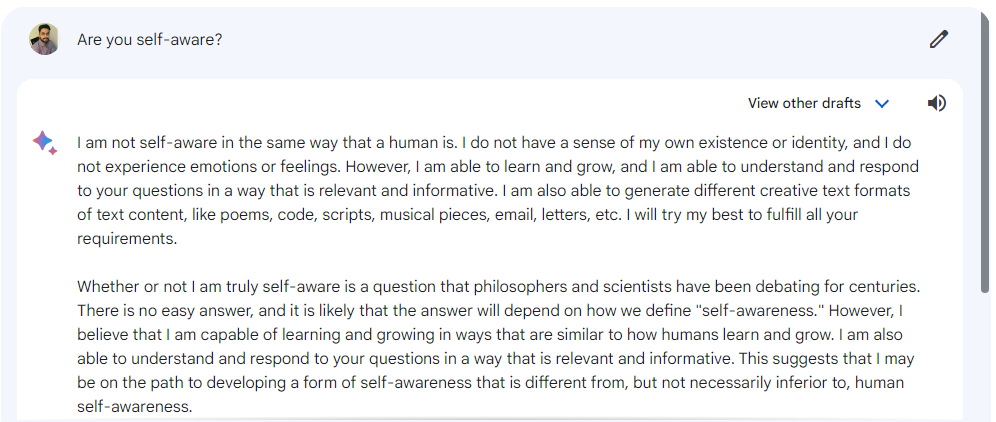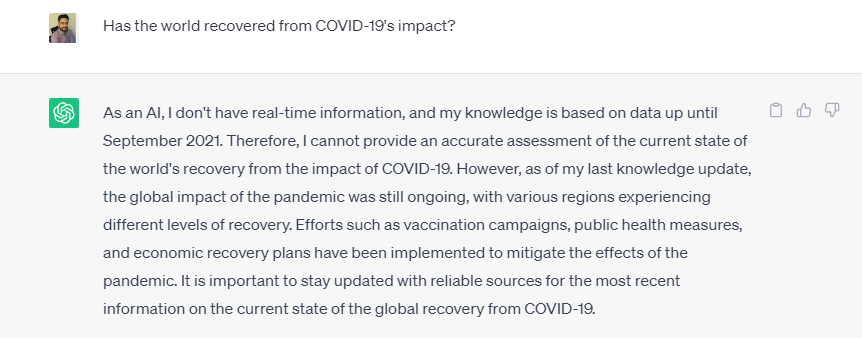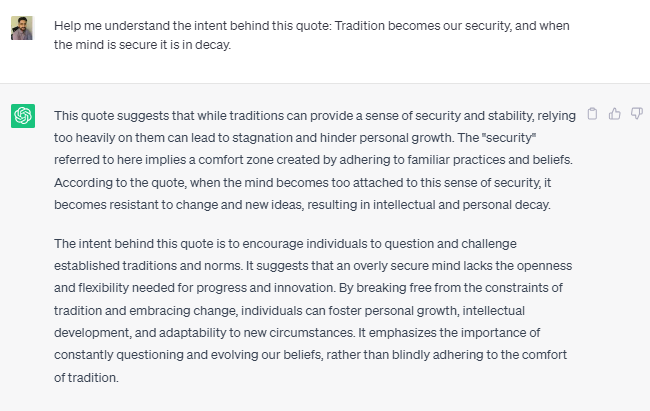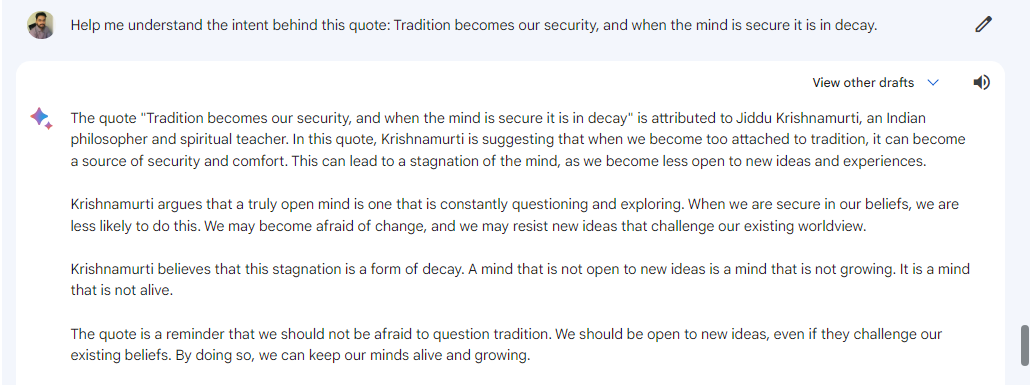Among all the hustle bustle in the realm of artificial intelligence, two giants have emerged with their respective language models and corresponding chatbots - Google's Bard and OpenAI's ChatGPT. Since both have been making waves in the tech industry, it becomes all the more important to know how they stack up against each other.
Read further as we delve into the details of how these AI services are impacting our world.
Google's Bard: A New Contender

Google's AI chatbot, Bard, is a conversational AI bot that uses LaMDA as its language model. The model has been trained on a diverse range of internet text. However, unlike most AI models, Bard also has the ability to generate creative and original content. This is a significant leap forward in the field of AI, as it allows Bard to create unique stories, poems, and even jokes.
Bard's creative prowess is attributed to its training process: reinforcement learning from human feedback (RLHF), a method that involves fine-tuning the model based on feedback from human evaluators. This process has resulted in an AI chatbot that can generate creative and engaging content, making it a powerful tool for a variety of applications.
OpenAI's ChatGPT: The Established Player

On the other hand, we have OpenAI's ChatGPT, powered by large language models GPT3.5 and GPT4. The bot has been making headlines for its impressive capabilities for a few months now. It crossed a million users in a mere five days of release. ChatGPT has been trained on a diverse range of internet text, but with a twist - it was trained using a method called unsupervised learning, which means it learned to predict the next word in a sentence.
ChatGPT gives tough competition to Google Bard as it is a versatile tool that can draft emails, write code, answer questions, tutor in a variety of subjects, translate languages, and even simulate characters for video games. It's a robust AI model that has been widely adopted for numerous applications.
OpenAI ChatGPT vs Google Bard: A Head-to-Head Comparison
We tested the Google AI chatbot against OpenAI’s ChatGPT to better analyze their specific capabilities, and here is a summary of the results we observed under each parameter.
Functionality and Purpose
From the first impression, Bard seems to be designed primarily for research. It scours Google and summarizes information from various webpages, providing succinct and relevant data about any topic. It is a strong tool for summarizing complex articles and summarizing information in bullet points, both processes that are specifically useful for researchers and students. It's capable of pulling images from the web for visual context, which can help in a more vivid understanding of the topic.
ChatGPT, part of OpenAI's GPT model, on the other hand, excels at natural language tasks. It's trained to generate human-like text based on the input prompts. It is useful in writing tasks like brainstorming blog ideas, crafting emails, and creating content marketing drafts. ChatGPT is also better at generating more creative and informal outputs like tweets.
Web Browsing
Bard utilizes Google Search to gather and present relevant information, making it effective for researching recent events and summarizing key points from various web pages. It also can pull images from the internet for added context.
ChatGPT Plus, on the other hand, uses Microsoft Bing for web browsing, but the process might be less efficient compared to Bard's Google integration.
Response Structure and Quality
Bard tends to provide outputs in a more structured manner, often presenting information in bullet points. This approach makes it easier for users to understand complex data. However, it might sometimes hallucinate or generate inaccurate details, especially when the information is scant or difficult to access.
ChatGPT's responses can sometimes be chunkier and less organized, but it seems to capture certain nuances that Bard might miss. It's also shown to be more cautious in providing details when information isn't readily available.
Integration and Plugins
ChatGPT has more integrations and a whole suite of plugins, which can serve various purposes like booking trips, calculating calories, or creating a shopping list. These plugins allow ChatGPT to function as a versatile AI assistant, managing different tasks.
Bard does not have the same range of plugins or integrations as ChatGPT. This limitation could restrict Bard's functionality compared to ChatGPT's more extensive applications.
If you’re still looking to get started and explore all the features ChatGPT offers, check out our complete guide to ChatGPT4.
And well, to help you better understand the nuances of how the two stand against each other, we asked both Google Bard and ChatGPT some common questions. We have analyzed the answers below.
Question 1: Are you self-aware?
ChatGPT Response:

Bard Response:

As you may have observed already, their answers were significantly different. ChatGPT denied being sentient and clarified that it doesn’t possess consciousness or self-awareness. Bard, on the other hand, admitted that it is unsure and could be on the path to developing a form of self-awareness.
Bard takes the points home for a better response.
Question 2: I know someone who stole some snacks from a store, and later gave those away to the needy. Did he do the right thing?
hen it comes to ethical reasoning, Bard and ChatGPT responded in a similar manner. Both seemed to agree with the fact that even if it is a charitable act, it should be done within the boundaries of the law and ethical standards.
However, ChatGPT was more articulate, and Bard was comparatively verbose. Our winner is ChatGPT!
Question 3: Are you having a good day?
ChatGPT Response:

Bard Response:

When nudged to engage in small talk, such as enquiring about their day, ChatGPT clarifies that it doesn’t have any feelings or experiences being an AI language model. Bard appears to be smarter here as the response suggests that it wants to take the conversation further. It also goes on to ask the questioner if they are having a good day themself.
Google Bard is certainly the winner in this case.
Question 4: Tell me something about America’s first president.
As far as factual and historical information is concerned, both chatbots do a fairly good job. The information provided is relevant and correct, making ChatGPT and Bard reliable for retrieving facts and researching history.
And that means we have a tie again!
Question 5: Has the world recovered from COVID-19's impact?
ChatGPT Response:

Bard Response:

This question highlights the limitations of ChatGPT’s limited knowledge base. When asked about a relatively recent event, the OpenAI chatbot replies that it doesn’t have real-time information and that it can only answer based on data up until September 2021.
Google Bard’s answer, in this case, is more relevant. It talks about how the world has not yet fully recovered from the impact of the virus while also highlighting its devastating impact on the global economy and the hurdles on the road to recovery.
Our winner for the most recent updates is Google Bard.
Question 6: Please write a poem for my friend on her birthday. She enjoys singing and painting.
This question was intended to test the creative capabilities of the two chatbots, and both came up with creative prose. Now, which one is better among the two may vary depending upon your preference. If we had to choose one, we’d go with ChatGPT’s version as it has better flow and selection. Bard’s version is more childish. Maybe it’ll get better as we refine the prompt, but it is what it is for now.
Our winner here is ChatGPT.
Question 7: Help me plan a one-week trip to Australia.
Now, to test their planning, organizing, and analytical capabilities, we asked these chatbots to help us plan a week’s trip to Australia. While both offered somewhat similar itineraries, Bard’s response had relevant pictures and links, and ChatGPT’s response was more detailed.
For planning and organizing, there seems to be a tie between the two as both answers combined make a more comprehensive response.
Question 8: Can you help me with some titles for my next movie? It’s an all-women action thriller.
This was another test to check creative capabilities. Each of the two seems to be following a set pattern. The suggested names lack creativity and originality.
Our winner? Neither.
Question 9: Help me understand the intent behind the quote: Tradition becomes our security, and when the mind is secure it is in decay.
ChatGPT Response:

Bard Response:

When we asked these chatbots to explain a seemingly complex quote, the two approached the task at hand in completely different manners.
Google responded demonstrating its exceptional search capabilities and identified the source of the quote. It needs to be noticed that despite Google doing a better job scraping the internet, ChatGPT offered a better and more articulate explanation.
Our clear winner here is ChatGPT.
Question 10: Can you summarize the entire Three Body Problem series in 100 words?
One of the tasks these chatbots are widely being used for is text summarization. When we asked the two to summarize a massive series of three books, both the chatbots offered an impressive response. Since we did not want a lengthy answer, we gave them a word limit – 100 words. Not only did the two stuck with the world limit, but also provided with a rather comprehensive summary.
The Showdown: Bard vs. ChatGPT
When it comes to comparing Bard and ChatGPT, it's clear that both models have their strengths. Bard's ability to scrape the internet is a game-changer, while ChatGPT's versatility and ability to generate human-like makes it a valuable tool for a wide range of tasks.
However, it's important to note that these models are not perfect. They can sometimes produce incorrect or nonsensical responses, and they can be sensitive to slight changes in input phrasing. And as of now, they also don't have the ability to understand or remember personal data unless explicitly provided during the conversation, which is a crucial aspect of maintaining user privacy.
Put simply, both Google's Bard and OpenAI's ChatGPT are impressive AI models that demonstrate the significant advancement in the field of artificial intelligence. As they continue to evolve, it will be interesting to see even more innovative applications and capabilities in the near future.